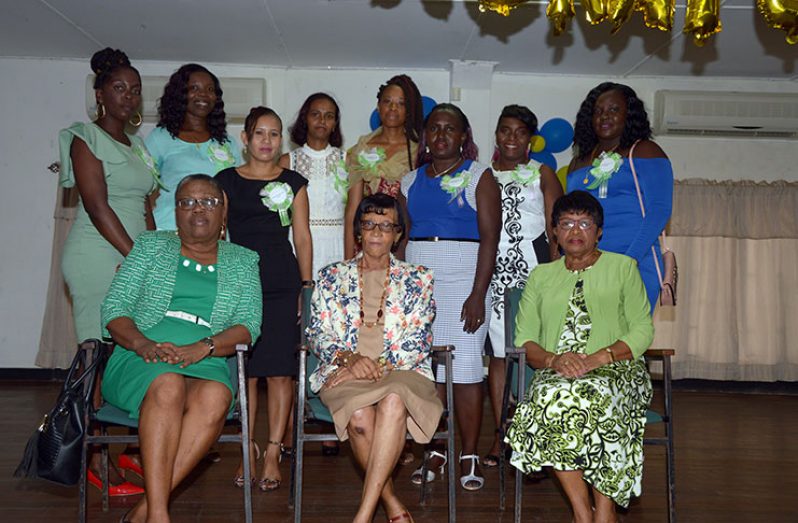By Wendella Davidson
A GROUP of women, who are members of the first graduating Childcare Management Class of 2019, is now equipped with the basic knowledge to enable them to function as child caregivers.
The group of 14 recently completed three months of intense study of the discipline conducted by the Adult Education Association.
Guyana Red Cross, Ms. Anne Greene, Director of the Childcare and Protection Agency, who delivered the feature address at a graduation ceremony held on June 14, 2019, likened good childcare workers as special gems. She said they are known to be rare, hard to find, and when found are priceless and invaluable.
As such, she exhorted the graduating class to “be the rare gems that are needed to ensure that children receive optimal care in any setting that they are placed, even as she cautioned of the messages sent when interacting with a child, since “Every word, facial expression, gesture, or action on the part of a caregiver gives the child some message about self-worth”.
She told the graduates that the sky is the limit for them and that there is a big world out there, as children are underserved, in particular, the ones that have to be placed in institutions due to no fault of their own, but mostly due to what the parent/caregiver did or did not do.
In reiterating that there is a shortage of good childcare workers, Green remarked that someone fitting the attribute must not only be certified by passing the exams and getting a certificate, but should really qualify by being suitable for the role.
She noted, too, that a childcare worker’s influence on a child can last a life time, hence, personal qualifications are important and must be a primary concern when hiring individuals to care for children.
On this note, Green urged that the graduates conduct a self-introspection to determine whether they possess, among other things, a willingness to continue and broaden their understanding about children and their development; a sense of value for human dignity, worth and especially a high regard for children as learning, growing human beings; the ability to respond to children in a warm, relaxed and friendly manner, but not so casual as to be meaningless; a sense of organisation and a willingness to share ideas and consider suggestions from others; self-confidence and a sense of security which comes through being informed about children, their abilities and needs and the developmental possibilities of children’s programme.
Additionally, an interest in improving communication with both adults and children; a willingness and ability to participate in children’s activities; having real interest in exploring the child’s world; an interest in learning, leading to a positive self-concept which promotes working with other adults and children without feeling inferior; patience and tolerance with active, curious and at times, noisy and difficult children; having the ability to be objective and professional with the staff and parents above the level of letting personality conflicts hinder the programme; the ability and willingness to cooperate and follow instructions; a sense of humour and a pleasant disposition; an appreciation for the efforts of children and a basic knowledge of child development, child-rearing and guidance, are other traits.
Course facilitator, Lieutenant Colonel (Ret’d) Christine King, in presenting a brief outline of the programme, noted that it commenced in March 2019 with 15 students and concluded on June 3, 2019.
During the three months duration, 90-minute lectures were conducted three days each week with the main focus being to enable the students to gain an understanding of various aspects of childcare; examine problems encountered in child care environment, and allow for exposure to developing the skills needed to deal with same.
The course also aimed at the application of skills and techniques to address various issues that may arise in child care management.
It also equipped the graduates to examine and identify causal factors for the emotional and behavioural problems of children in their care; the professional nature of child management and the role of the family in child development; acquire knowledge of human growth and development and develop and practice the skills and techniques to perform competently as caregivers.
The Childcare Management Course, King noted, was launched in 1996 as a collaborative effort between the Guyana Association of Professional Social Workers (GAPSW) and the Women’s Outreach Programme of Adult Education Association (AEA). It was after the GAPSW saw the need for the training of child carers. During that training programme, a number of trained socials workers, including King, teamed up to produce a manual that is now a recommended course text.
She noted that over the years, the course has produced hundreds of graduates, mostly women though, adding that among them are some who have established their own play/nursery schools, day care centres or are functioning as care givers at such facilities.
In addition to receiving certificates, several of the graduates were presented with trophies for exceptional performance, including Cheryl Inniss who was awarded `Best Student’. Sheneille Ramtillack and Rhonda Daniels-Chance were the first and second runners-up, respectively.
The programme also featured brief reflections by some of the graduates, welcome remarks by Executive Director of the AEA, Mrs Patricia David, and graduate, Shaquean King, delivering the Vote of Thanks.



.jpg)










